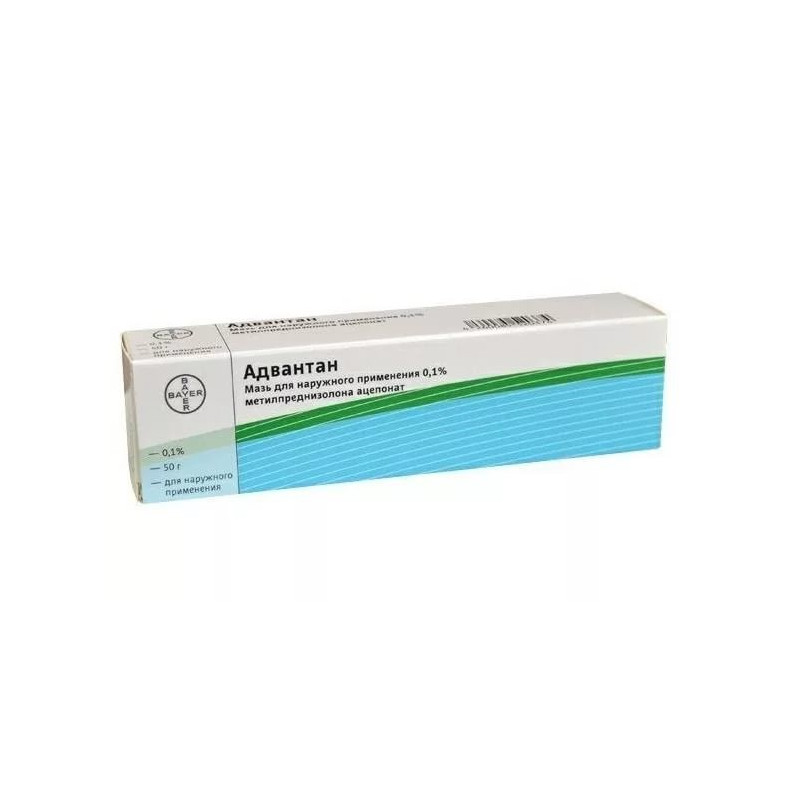



 All payments are encrypted via SSL
All payments are encrypted via SSL
 Full Refund if you haven't received your order
Full Refund if you haven't received your order
Advantan
Methylprednisolone aceponate.
Ointment for external use.
1 g ointment contains
Active substance: Methylprednisolone aceponate 0.001 g.
Excipients: white soft paraffin - 0.350 g, liquid paraffin - 0.239 g, white beeswax - 0.040 g, Dehimuls E emulsifier, 0.070 g, purified water - 0.300 g
Homogeneous white or slightly yellowish opaque ointment.
Glucocorticosteroid for topical use.
The active ingredient of Advantan, methylprednisolone aceponate, is a non-halogenated steroid.
When applied externally, Advantan suppresses inflammatory and allergic skin reactions, as well as those associated with enhanced proliferation, which leads to a decrease in the objective symptoms of inflammation (erythema, edema, oozing, etc.) and subjective sensations (itching, irritation, pain and etc.).
When methylprednisolone aceponate is used externally at the recommended dose, the systemic effect is minimal in both humans and animals. After repeated application of Advantan on large surfaces (40-60% of the skin surface), as well as application under the occlusive dressing, no impairment of function is observed.
adrenal glands: plasma cortisol levels and its circadian rhythm remain within the normal range, and there is no decrease in cortisol levels in daily urine.
In clinical studies with Advantan up to 12 weeks in adults and up to 4 weeks in children (including young children), no development of skin atrophy, telangiectasias, striae and acne-like rashes were detected.
Methylprednisolone aceponate (especially its main metabolite, 6α-methylprednisolone-17-propionate) binds to intracellular glucocorticosteroid receptors. The steroid-receptor complex binds to specific parts of the DNA of the cells of the immune response, thus causing a series of biological effects.
In particular, the binding of the steroid-receptor complex with DNA cells of the immune response leads to the induction of macrocortin synthesis. Macrocortin inhibits the release of arachidonic acid and, thereby, the formation of inflammatory mediators such as prostaglandins and leukotrienes.
Inhibition of the synthesis of vasodilating prostaglandins by glucocorticosteroids and the potentiation of the vasoconstrictive action of adrenaline lead to a vasoconstrictor effect.
Methylprednisolone aceponate is hydrolyzed in the epidermis and dermis. The main and most active metabolite is 6α-methylprednisolone-17-propionate, which has a significantly higher affinity for the glucocorticosteroid receptors of the skin, which indicates the presence of its “bioactivation” in the skin.
The degree of percutaneous absorption depends on the condition of the skin, the dosage form and the method of application (with or without an occlusive dressing).
Percutaneous absorption in children and adults with atopic dermatitis (neurodermatitis) and psoriasis was no more than 2.5%, which is only slightly higher compared with healthy volunteers (0.5-1.5%).
After entering the systemic circulation, 6α-methylprednisolone-17-propionate is rapidly conjugated with glucuronic acid and, thus, in the form of 6α-methylprednisolone-17-propionate, glucuronide is inactivated.
Metabolites of methylprednisolone aceponate are eliminated mainly by the kidneys with a half-life of about 16 hours. Methylprednisolone aceponate and its metabolites do not accumulate in the body.
Inflammatory skin diseases sensitive to therapy with topical glucocorticosteroids:
If necessary, the use of Advantan ointment during pregnancy and lactation should carefully weigh the potential risk to the fetus and the expected benefit of treatment for the mother. During these periods, prolonged use of the drug on large skin surfaces is not recommended.
Nursing mothers should not put the drug on the mammary glands.
Outwardly. Adults and children from 4 months of age. The drug is applied 1 time per day with a thin layer on the affected skin.
As a rule, the duration of continuous daily treatment with Advantan should not exceed 12 weeks for adults and 4 weeks for children.
For subacute or chronic inflammatory skin diseases that are not accompanied by weeping, a dosage form with a balanced ratio of fat and water is necessary. Ointment Advantan has a therapeutic effect, also helping to eliminate dry skin and restore its normal fat content.
Usually the drug is well tolerated.
Very rarely (in less than 0.01% of cases), local reactions can occur, such as itching, burning, erythema, and vesicular rash formation. If the drug is used for more than 4 weeks and / or over an area of 10% or more of the body surface, the following reactions may occur: skin atrophy, telangiectasia, stretch marks, acneform skin changes, systemic effects due to corticosteroid absorption. In clinical studies, none of the above side effects were noted with Advantan used for up to 12 weeks in adults and up to 4 weeks in children.
In rare cases (0.01% - 0.1%), folliculitis, hypertrichosis, perioral dermatitis, depigmentation of the skin, allergic reactions to one of the components of the drug can be observed.
When studying the acute toxicity of methylprednisolone aceponate, there was no risk of acute intoxication in case of excessive single skin application (application of the drug over a large area under conditions favorable for absorption) or unintentional ingestion.
With excessively long and / or intensive use of glucocorticosteroids, skin atrophy may develop (thinning of the skin, telangiectasia, striae).
With the appearance of atrophy, the drug must be canceled.
Not found.
In the presence of bacterial complications and / or dermatomycosis, in addition to treatment with Advantan, specific antibacterial and / or antimycotic treatment is necessary.
Avoid contact with eyes.
As with the use of systemic glucocorticosteroids, glaucoma may develop after external use of glucocorticosteroids (for example, when using large doses or very long use of occlusive dressings or on the skin around the eyes).
Not found.
Ointment for external use of 0,1% on 5, 15, 20, 25, 30 and 50 g in the aluminum tube laminated by polyethylene, sealed by a membrane, with the screwed-on plastic cap. The tube together with the instructions for use is placed in a cardboard box.
Store at a temperature not higher than 25 ºС.
Keep out of the reach of children.
3 years.
Do not use after expiration date.
Vacation without a doctor's prescription.
